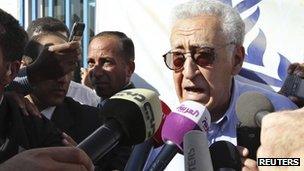Obama's UN General Assembly speech condemns extremism
- Published
- comments
President Obama: "It is the obligation of all leaders to speak out forcefully against violence and extremism"
US President Barack Obama has urged global leaders to rally against extremism in an address to the UN General Assembly in New York.
Mr Obama said it was the obligation of all leaders, external to speak out forcefully against violence and extremism, as he framed his speech with references to the US ambassador murdered in Libya.
Unrest across the Middle East is set to dominate discussion at the summit.
Mr Obama also again stressed the US would not allow Iran nuclear weapons.
He said the US would "do what we must" to stop Tehran acquiring nuclear arms. Six weeks before the US election, the president said a nuclear-armed Iran was "not a challenge that can be contained".
'Marginalise hatred'
Iran's nuclear programme and the 18-month conflict in Syria have featured strongly in Tuesday's speeches at the Assembly, as have the recent protests across the Muslim world in response to a US-made video mocking the Prophet Muhammad.
The US president condemned the violence that erupted over the "disgusting" anti-Islam video as "an attack on UN ideals".
Referring to the US envoy who was killed in Benghazi on 11 September during protests sparked by the video, Mr Obama challenged the UN to affirm that "our future will be determined by people like Christopher Stevens, and not by his killers".
"It is time to marginalise those who - even when not resorting to violence - use hatred of America, or the West, or Israel as a central principle of politics," said Mr Obama.
"That brand of politics only makes it harder to achieve what we must do together: educating our children and creating the opportunities they deserve; protecting human rights and extending democracy's promise."
'Regional calamity'
While not formally on the General Assembly's agenda, Syria has been a focal point of debate.
Qatari Emir Sheikh Hamad bin Khalifa al-Thani said the UN Security Council's failure to end the conflict meant it would be better for Arab countries to "interfere" in Syria.
French President Francois Hollande said the current Syrian leadership had no future, pledged to recognise a new provisional government as soon as it was formed and called on the UN to protect liberated areas of the country.
Opening the meeting earlier on Tuesday, UN Secretary General Ban Ki-moon described the fighting in Syria as "a regional calamity with global ramifications".
He called for action from the divided UN Security Council and said "the international community should not look the other way as violence spirals out of control".
The US president was blunter in his assessment, saying Bashar Assad's regime must end.
On Monday UN envoy Lakhdar Brahimi warned on his return from a visit to Damascus and Syrian refugee camps in neighbouring Jordan and Turkey that the situation was "extremely bad and getting worse".
Diplomats have played down expectations for Mr Brahimi's mission, says the BBC's Barbara Plett in New York, with no sign of fundamental divisions on the Security Council being bridged.
In other developments:
Pakistani President Asif Ali Zardari defended his government's record against extremism, saying no country had suffered more in the fight against terrorism; he said acts that endangered the world by "misusing freedom of expression" should be criminalised
Afghanistan's leader Hamid Karzai called on the UN to ease sanctions on Taliban leaders in order to help facilitate peace talks
Mr Hollande called for an international force to be sent to the West African state of Mali to help dislodge Islamist militants who have taken over the country's north
Mr Ban warned the door for negotiating a two-state solution to the Israeli-Palestinian peace process - "the only sustainable option" - may be closing "for good" due to continued Israeli settlement construction in the Palestinian Territories
Indonesian President Susilo Bambang Yudhoyono called for an international treaty to "prevent incitement to hostility or violence based on religions or beliefs"
Argentina's President Cristina Fernandez said Argentina's and Iran's foreign ministers will meet on the fringes of the summit to discuss bomb attacks on Buenos Aires in the 1990s
Mr Ban hosted a lunch for the more than 120 world leaders, but Mr Obama did not attend, leaving it to Secretary of State Hillary Clinton to offer the host country's traditional toast
No red lines
Although the White House said Mr Obama's address was not a campaign speech, it follows critical remarks about his foreign policy from Republican presidential candidate Mitt Romney.

UN envoy Lakhdar Brahimi has just visited Damascus and refugee camps in Jordan and Turkey
His presidential rival condemned Mr Obama's description of the murder of Mr Stevens and three other Americans as "bumps in the road".
He has also castigated him for not taking time out to hold talks on Iran during the summit with Israeli PM Benjamin Netanyahu.
Mr Obama has rejected the Israeli leader's calls for Washington to set Tehran "red lines".
Instead, he said the United States would "do what we must to prevent Iran from obtaining a nuclear weapon" with the backing of "a coalition of countries" holding Tehran accountable.
Tehran says its nuclear programme is for civilian purposes.